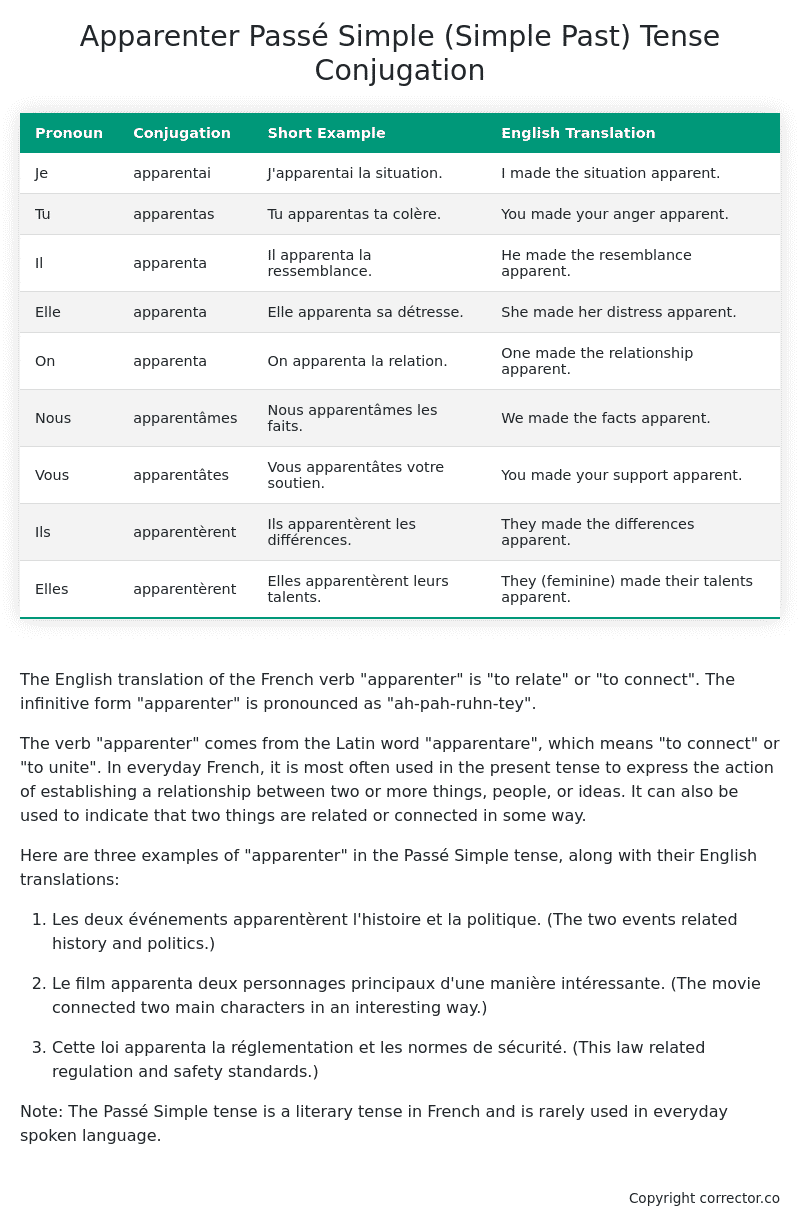Passé Simple (Simple Past) Tense Conjugation of the French Verb apparenter
Introduction to the verb apparenter
The English translation of the French verb “apparenter” is “to relate” or “to connect”. The infinitive form “apparenter” is pronounced as “ah-pah-ruhn-tey”.
The verb “apparenter” comes from the Latin word “apparentare”, which means “to connect” or “to unite”. In everyday French, it is most often used in the present tense to express the action of establishing a relationship between two or more things, people, or ideas. It can also be used to indicate that two things are related or connected in some way.
Here are three examples of “apparenter” in the Passé Simple tense, along with their English translations:
-
Les deux événements apparentèrent l’histoire et la politique.
(The two events related history and politics.) -
Le film apparenta deux personnages principaux d’une manière intéressante.
(The movie connected two main characters in an interesting way.) -
Cette loi apparenta la réglementation et les normes de sécurité.
(This law related regulation and safety standards.)
Note: The Passé Simple tense is a literary tense in French and is rarely used in everyday spoken language.
Table of the Passé Simple (Simple Past) Tense Conjugation of apparenter
| Pronoun | Conjugation | Short Example | English Translation |
|---|---|---|---|
| Je | apparentai | J’apparentai la situation. | I made the situation apparent. |
| Tu | apparentas | Tu apparentas ta colère. | You made your anger apparent. |
| Il | apparenta | Il apparenta la ressemblance. | He made the resemblance apparent. |
| Elle | apparenta | Elle apparenta sa détresse. | She made her distress apparent. |
| On | apparenta | On apparenta la relation. | One made the relationship apparent. |
| Nous | apparentâmes | Nous apparentâmes les faits. | We made the facts apparent. |
| Vous | apparentâtes | Vous apparentâtes votre soutien. | You made your support apparent. |
| Ils | apparentèrent | Ils apparentèrent les différences. | They made the differences apparent. |
| Elles | apparentèrent | Elles apparentèrent leurs talents. | They (feminine) made their talents apparent. |
Other Conjugations for Apparenter.
Le Present (Present Tense) Conjugation of the French Verb apparenter
Imparfait (Imperfect) Tense Conjugation of the French Verb apparenter
Passé Simple (Simple Past) Tense Conjugation of the French Verb apparenter (You’re reading it right now!)
Passé Composé (Present Perfect) Tense Conjugation of the French Verb apparenter
Futur Simple (Simple Future) Tense Conjugation of the French Verb apparenter
Futur Proche (Near Future) Tense Conjugation of the French Verb apparenter
Plus-que-parfait (Pluperfect) Tense Conjugation of the French Verb apparenter
Passé Antérieur (Past Anterior) Tense Conjugation of the French Verb apparenter
Futur Antérieur (Future Anterior) Tense Conjugation of the French Verb apparenter
Subjonctif Présent (Subjunctive Present) Tense Conjugation of the French Verb apparenter
Subjonctif Passé (Subjunctive Past) Tense Conjugation of the French Verb apparenter
Subjonctif Imparfait (Subjunctive Imperfect) Tense Conjugation of the French Verb apparenter
Subjonctif Plus-que-parfait (Subjunctive Pluperfect) Tense Conjugation of the French Verb apparenter
Conditionnel Présent (Conditional Present) Tense Conjugation of the French Verb apparenter
Conditionnel Passé (Conditional Past) Tense Conjugation of the French Verb apparenter
Conditionnel Passé II (Conditional Past II) Tense Conjugation of the French Verb apparenter
L’impératif Présent (Imperative Present) Tense Conjugation of the French Verb apparenter
L’impératif Passé (Imperative Past) Tense Conjugation of the French Verb apparenter
L’infinitif Présent (Infinitive Present) Tense Conjugation of the French Verb apparenter
L’infinitif Passé (Infinitive Past) Tense Conjugation of the French Verb apparenter
Le Participe Présent (Present Participle) Tense Conjugation of the French Verb apparenter
Le Participe Passé (Past Participle) Tense Conjugation of the French Verb apparenter
Struggling with French verbs or the language in general? Why not use our free French Grammar Checker – no registration required!
Get a FREE Download Study Sheet of this Conjugation 🔥
Simply right click the image below, click “save image” and get your free reference for the apparenter Passé Simple tense conjugation!

Apparenter – About the French Passé Simple (Simple Past) Tense
Formation
Usage
Narration
Historical Context
Interactions with other tenses
Passé Composé
Imparfait
Conditional and Subjunctive
Summary
I hope you enjoyed this article on the verb apparenter. Still in a learning mood? Check out another TOTALLY random French verb conjugation!


